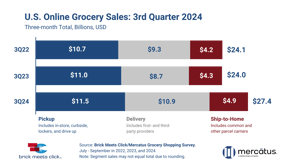Connecting with customers on wellness
It’s an exciting time to be in the grocery business, as food retailers have the opportunity to make a measurable difference in consumers’ lives. Grocers have truly become a destination for health and wellness, writes Industry Voices contributor Natalie Menza, health and wellness manager at Wakefern.
It’s an exciting time to be in the grocery business, as food retailers have the opportunity to make a measurable difference in consumers’ lives. Grocers have truly become a destination for health and wellness.
 As a registered dietitian for Wakefern, I witness innumerable opportunities that demonstrate the intersections among food, nutrition and pharmacy at the retail level. I am excited to partner with the Food Marketing Institute (FMI) to help bring these big ideas to life at the FMI Health & Wellness Retail Zone at FMI Connect in June, a dedicated area showcasing how retailers can make their store a health and wellness destination for shoppers.
As a registered dietitian for Wakefern, I witness innumerable opportunities that demonstrate the intersections among food, nutrition and pharmacy at the retail level. I am excited to partner with the Food Marketing Institute (FMI) to help bring these big ideas to life at the FMI Health & Wellness Retail Zone at FMI Connect in June, a dedicated area showcasing how retailers can make their store a health and wellness destination for shoppers.
At ShopRite stores, we’re witnessing a surging momentum and interest in health and nutrition among consumers that our retail dietitians can help encourage. Specifically, FMI research demonstrates that the majority of shoppers across age groups do put some effort into eating healthily, while only six percent don’t try at all. Among those consumers making the effort, 74 percent report success with eating healthily more than half the time, which is the highest rate since 2007 [Shopping for Health 2013].
Before I came to Wakefern in 2005 I spent many years in the clinical setting. This experience enables me to help customers shop better and influence merchandising strategies in order to make healthy choices more accessible and convenient. The good news is that through surveys that we’ve done through FMI, we see an upward trend in the number of dietitians in supermarkets: Eighty-five percent of companies surveyed have a corporate dietitian, 30 percent have an in-store dietitian and 25 percent have regional dietitians [FMI 2013 Retailer Contributions to Health & Wellness Survey].
These dietitians work in parallel with pharmacists in order to help educate and counsel on food allergies; offer health screenings; counsel on drug interactions; emphasize weight management courses; and even develop specialty recipes. I work closely with ShopRite pharmacies on in-store programs, such as diabetes management, lectures and screenings, drug-nutrient interaction counseling and medication management. We also create events and in-store programs featuring cooking classes; Facebook chats; recipes; lifestyle choice labels and one-on-one consultations.
By implementing and leveraging a strong health and wellness strategy, retailers can tailor programs to their unique customer bases and serve as a community resource. At FMI Connect in June, we’ll be introducing various screenings and new applications to the exhibit floor at the Health & Wellness Retail Zone. These screenings will serve as engagement tools and will help to identify ideas for retailers who wish to augment their wellness initiatives.
Complementing the health screenings, we’ll also feature retailers and vendors presenting case studies and solutions at a demo stage in the Zone. The demo topics include inspiring concepts such as how to implement a corporate wellness program, to the role of the dietitian in stores.
Reflected in our work as an industry, food retail has proved to be a physical hub for health and wellness and food retailers represent the future of health care. Neighborhood supermarkets are now destinations for food, pharmacy and healthy living.
Join the #FMIConnect conversation or engage us via #FMIHealth. Visit www.FMIConnect.org for more information.
About the Author
You May Also Like






